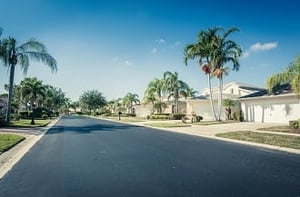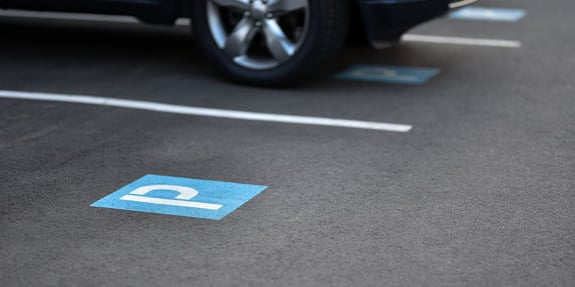The intense Florida heat poses serious safety hazards and if not maintained properly, damages can progress to large cracks and potholes, neither of which you want in your parking lot, on your roads, or parking decks.

All hard surfaces, including asphalt, will absorb heat. You can feel it when you walk outside, especially in the summertime. This results in UHI (Urban Heat Island). This is an effect, especially in urban environments, where there is less vegetation and more concrete or asphalt, in which you will experience higher temperatures than those areas that have lots of vegetation. When the temperature is 75 degrees, asphalt can heat up to 125 degrees. To put it in perspective, you can fry an egg on asphalt when the temperature reaches 131 degrees.
When asphalt is exposed to hot temperatures, it begins to expand and if it expands too much, it will start to crack. The crack weakens the pavement and the heat causes the pavement to buckle and warp. We’ve all run over these “bumps” in parking lots and roads. This is because the road is made in layers. The crack, over time, will become bigger and then you have a whole new problem……..WATER!
Besides the Florida heat, we all know we have an abundance of rain. Water will seep into those cracks, made by the heat, and erode the sub-surface layers which results in an air gap that forms within the pavement. If the pavement above these sub-surface gaps experiences any pressure, like the weight of vehicles passing over it, the top layer of the asphalt will sag, collapse and then crumble, which we like to call POTHOLES.
Even if the rain doesn’t get to your asphalt, if your roads, parking lot or other asphalt areas at the bottom of steep terrain, running water, or standing water, can wash away asphalt little by little over time, leaving behind only bar rock and aggregate (think crumbling pavement). It is recommended that you seal your asphalt every few years in order to protect the surface layer. This will help to keep water from penetrating the asphalt and add an extra layer of protection against extreme temperatures. If you are quick to fix small cracks, the less of a chance that water will penetrate the asphalt and that your small problem won’t become a BIG problem. Make sure you have adequate drainage in your parking lots and on your roadways.
